Stalin's three days. Beaverbrook and Harriman's Unclassified Mission
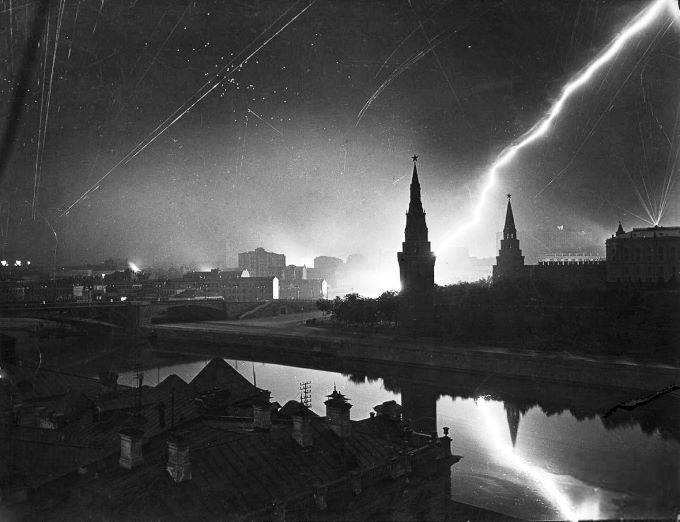
Who instead of Harry Hopkins
Almost until the end of 1941, the Soviet Union confronted Nazi Germany with only one ally - Great Britain. At this time, the United States preserved its friendly neutrality, as President Roosevelt promised the Americans when he was elected for a third term, and the people still had to be convinced of the need to fight the Nazis.
However, it was the United States that was the first to send its plenipotentiaries to Moscow, led by F.D. Roosevelt's assistant Harry Hopkins. The rather unexpected success of his trip to the Soviet capital has already been written in the pages of "Military Review" ("USSR and the allies: at the origins of Lend-Lease"), and it was Hopkins who was awaited in the Kremlin for a detailed study of plans for allied assistance to the Soviet Union.
Along with American supplies, British aid had to be negotiated. Therefore, the second delegation, which went to Moscow at the end of September, became Anglo-American. Because of Hopkins' illness, instead of him from Roosevelt to Stalin went 50-year-old millionaire Averell Harriman, a real oligarch, a railroad tycoon who went into politics only under the influence of Roosevelt's New Deal.
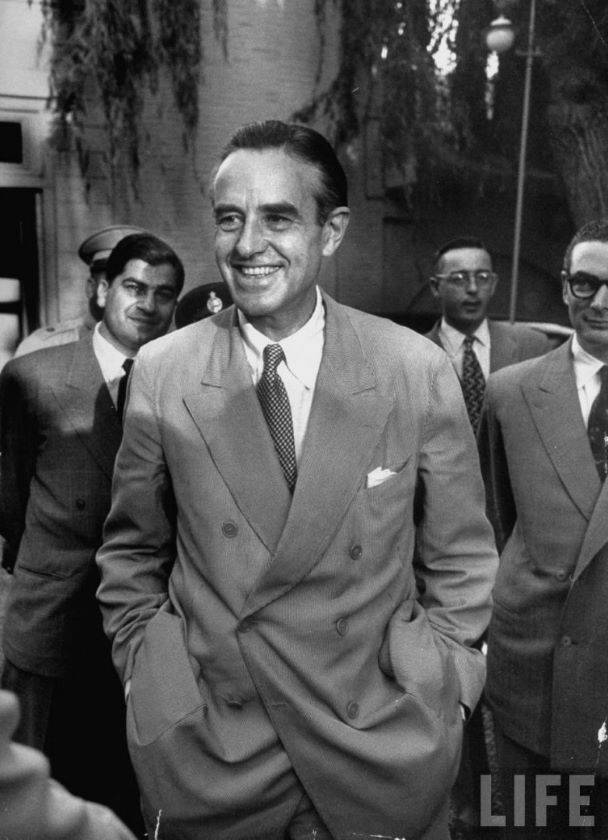
Unlike Hopkins' visit, which was accompanied by only two aviators, a rather large team flew with Harriman to Moscow: Admiral Standley, two generals, Burns and Chanei, Colonel Faymonville and politician William Batt.
The British delegation, which also included a politician, Deputy Secretary of State for aviation Harold Balfour, two generals, Macready and Ismail, and Sir Rowlands and Wilson, were headed by Lord Beaverbrook, master of a powerful newspaper empire and a close friend of Prime Minister Churchill.
Shortly before the mission to Red Russia, Harriman, the special envoy of the US President, spent a lot of time in London, negotiating the terms of Lend-Lease deliveries to Great Britain. In the English capital, he met with Lord Beaverbrook, who at that time held a very suitable post of Secretary of Supply, and before that headed the British aviation industry.
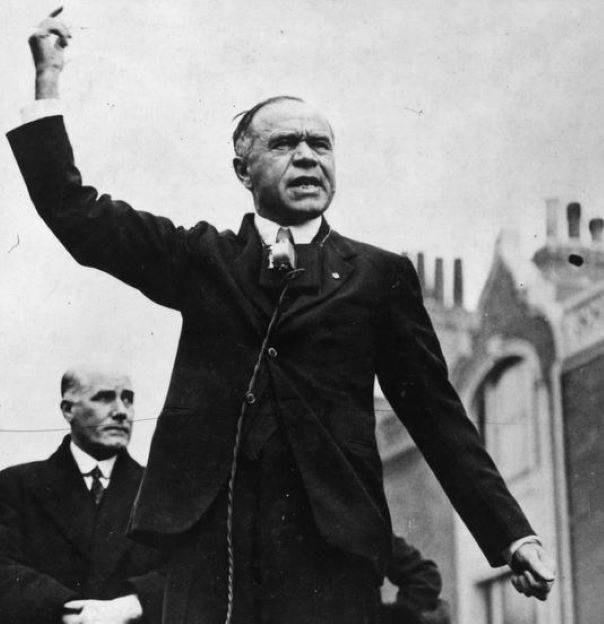
Both high-ranking guests of Stalin were listed as aristocrats, although they were not by blood. Averell Harriman comes from a Jewish family of financiers and entrepreneurs, and did not really need titles in the United States. But Lord Beaverbrook was a native of Canada with the modest name of William Maxwell Aitken, and he received his peerage from Prime Minister D. Lloyd George in 1916 for helping to oust the liberal cabinet of G. Asquith.
President Roosevelt supplied Averell Harriman with a personal letter to the Soviet leader - a letter of the same kind as he had transmitted with Hopkins a couple of months earlier.
This letter will be delivered to you by my friend Averell Harriman, whom I asked to be the head of our delegation to be sent to Moscow.
Mr. Harriman is well aware of the strategic importance of your front, and I am sure he will do everything he can to successfully complete the talks in Moscow.
Harry Hopkins told me in detail about his encouraging and satisfactory meetings with you. I cannot tell you how much we all admire the valiant defensive struggle of the Soviet armies ...
Lord Beaverbrook did not receive any messages from Churchill, neither of them considered it necessary. And this was in the tradition of British diplomacy, especially since Beaverbrook was the first of the major politicians of the empire to visit the USSR after the start of the war on the Eastern Front.
It is characteristic that Harriman and Beaverbrook in those days constantly remained in touch with Harry Hopkins, thereby recognizing his undeniable authority on Lend-Lease matters. And this is despite the fact that the USSR has not yet given the final approval to join the program.
Without omitting details
Before leaving for the Soviet capital (Harriman and Beaverbrook on a British cruiser, and mission staff on B-24 aircraft), lengthy preliminary consultations were held in London. But they were in the first place, not specifics, but politics.
The British tried with all their might to reduce supplies to the USSR to the required minimum, fearing that in the event of the defeat of the Russians, everything, equipment, weapons, and food, would go to the Germans. Moreover, this approach arose clearly under the impression of publications in the press, although who, if not Lord Beaverbrook, knew the price of propaganda better than anyone else.
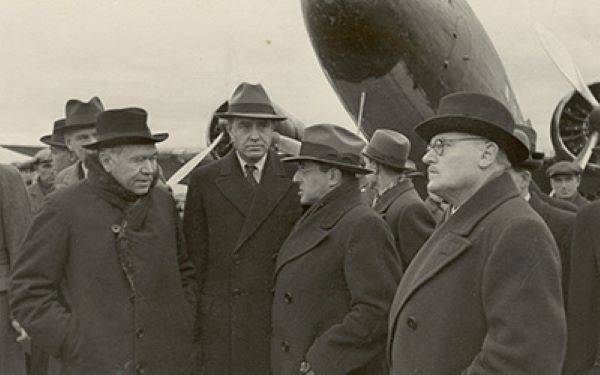
On the other hand, negotiations with the Soviet leadership, in fact personally with Stalin, took only three days, although initially the Allies planned two days. On the very first day, September 28, the leader of the Bolshevik Party, who had headed the Soviet government just on the eve of the war, briefly and very specifically acquainted the Allied representatives with the situation at the front.
From Stalin's confessions of the superiority of the Germans in forces, his statements about the need to open a second front in Europe, as well as requests to send British troops to fight in Ukraine, the conclusion literally suggested itself. The Soviet leadership will not agree to negotiations with Hitler, the Red Army will be able to withstand, but for a turning point in the war, it urgently needs help. However, the country as a whole needs it.
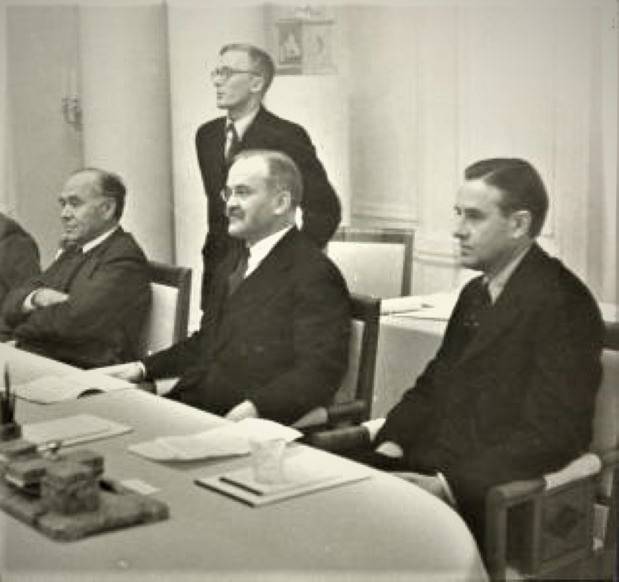
The Soviet leader raised the issue of the goals of peace and even suggested "to make the Germans pay for the damage." After that, Stalin literally bombarded the guests, primarily Lord Beaverbrook, with clear and specific questions about what and how, on what terms, would be supplied to the Soviet Union in the foreseeable future.
The British baron seemed to have been interrogated, although it is clear that Stalin just wanted to know exactly what the Russians could expect in the near future, and these were the equipment and materials that were already on the islands in Britain. From the transcript of the conversation published long ago, it can be seen that Beaverbrook often simply "floated", saying: "I will find out, I will make inquiries, I will answer your question tomorrow."
To Harriman, many of the answers were given somewhat easier: his specifics were closer to the American businessman. But he was once forced to sign ignorance as soon as the Soviet leader started talking about the technical characteristics and weapons of fighters.
Nevertheless, the first half was clearly played by the partners on the whole successfully, Stalin and Beaverbrook even managed to discuss the situation with the landing in Britain of Rudolf Hess, one of Hitler's close associates.
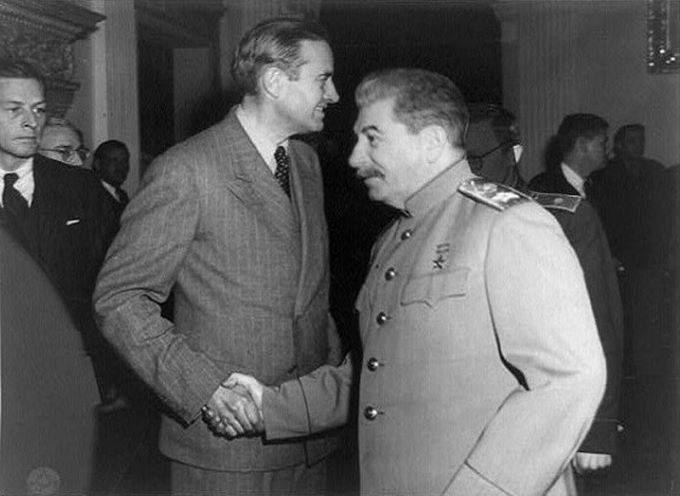
The technical personnel now had a lot of work to do to clarify the basically agreed arrangement of supplies of equipment and weapons to the USSR, as well as reciprocal supplies of raw materials and materials to the USA and Great Britain. Both heads of the Union delegations were deeply impressed by Stalin and admired the struggle of the Soviet people.
Germans can lie further
The second day of negotiations turned out to be much more difficult, moreover, as in London, due to the fact that politics crowded out real decisions. To begin with, the topic of mutual recognition of the pre-war status quo emerged, which had previously been regularly raised by Soviet diplomats, puzzled by the need to push through the recognition of the reunification of the Baltic countries with Russia.
However, Stalin had enough tact and endurance to propose to postpone the solution of such problems until after the victory. After talking in detail about the armor plate, Willis cars and the fact that the armored cars offered by the Americans are traps and he does not need them, the Soviet leader reminded the negotiators of German propaganda, which tried to split the ranks of the only emerging Union of Three.
Joseph Goebbels, whom one of the American journalists called "the master of a pack of Nazi propagandists", tried to ridicule the very meeting in Moscow. "The British and Americans will never find a common language with the Bolsheviks." The conviction that this thesis works, Goebbels not only carried until 1945, but also forever instilled it in his Fuhrer.
Stalin understood that in this case he could not count on real secrecy, which was familiar to Soviet diplomacy and politics, but he did not hide his irritation. It should be recalled that the Germans began their press campaign against the Moscow meeting even earlier, when they managed not only to intercept, but also to accurately misrepresent Roosevelt's personal message to Stalin.
The one that was broadcast with Averell Harriman. Hitler's agitators did not come up with anything better for North and South America, where the DNB (Deutsche Nachrichten Buro) agency broadcast, how to replace the address to Stalin “Dear Sir” with “My dear friend”, and the end of “Sincerely yours” with “With an expression of heart friendship. "
As a result, the difficult day ended with the fact that it was decided to meet again, prolonging the negotiations, and regarding German propaganda, Stalin, already opening the meeting on the third day, September 30, said that the three of them needed to prove that Goebbels was a liar.
Lend-Lease and nothing else
A memorandum was already prepared for the final meeting with a list of everything the Russians asked for. Lord Beaverbrook promptly indicated those materials and equipment, the need for which the British and Americans were not able to satisfy immediately. After that, the head of the British delegation long and tediously read out a list of what could be supplied even with the excess of Soviet requests.
For all the harsh perception of the allied aid, which Stalin did not even try to hide, here he admitted that he "accepts the list with delight." It is characteristic that the format according to which allied deliveries would be carried out did not bother him at all.
But as such, the Lend-Lease scheme, by all indications, did not inspire the Soviet leader as much as Soviet diplomats and foreign trade did before. All of them saw the American approach as something like a desire to enslave Russia. Stalin's pragmatist was clearly embarrassed by the need to subsequently pay for what was used to achieve a common victory.
At the same time, the USSR simply did not have the funds for direct purchases of weapons and ammunition. In order to translate into reality the willingness that the Americans showed to lend to a new ally for military supplies with practically no restrictions, not only the consent of the Russians was required, but also a legislative decision in the United States itself.
Averell Harriman never tired of repeating, instructing his subordinates: "Give, give and give, not counting on a return, no thoughts of getting anything in return."
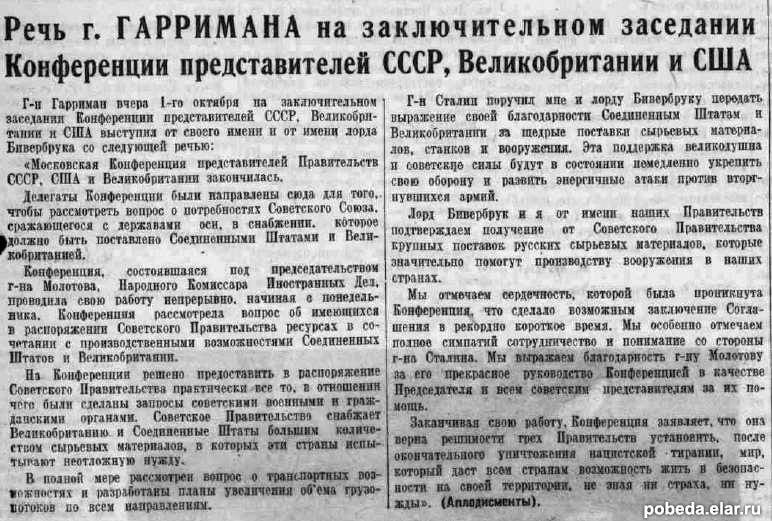
President Roosevelt succeeded in adding the USSR to the list of countries that "are fighting in defense of the interests of the United States," despite the fierce resistance of all political opponents. He managed to persuade even American Catholics, who unequivocally considered the Bolsheviks to be the fiend of hell, for which the owner of the White House sent his special envoy to Pope Pius XII.
Roosevelt signed a document stating that the Lend-Lease program extended to the USSR on November 7, 1941. On the anniversary of the October Revolution and the day of the legendary parade on Red Square. Agree, and today it is not a sin to say thank you for such a gift. And the first deliveries to the Soviet Union under Lend-Lease began in October 1941. Then Stalin's subordinates only figured out how to fit into this not entirely clear program.
- Alexey Podymov
- pobeda.elar.ru, omgpu.ru, pastvu.ru, oldmos.ru, s019.radical.ru, allians.rusarchives.ru
Information